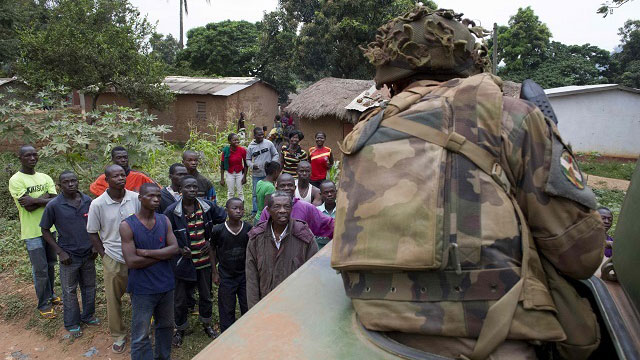SUMMARY
This is AI generated summarization, which may have errors. For context, always refer to the full article.

BANGUI, Central African Republic – President Francois Hollande on Tuesday, December 10, said France’s intervention in the Central African Republic is dangerous but vital to avoid a bloodbath, during a visit to shore up morale after two elite French soldiers were killed.
Hollande flew into the curfew-bound capital Bangui from Johannesburg after attending a memorial service for South African peace icon Nelson Mandela.
Upon arrival, the French leader paid tribute to his country’s two fallen soldiers, bowing before their coffins at a base at Bangui airport.
The French campaign to restore security in its former colony is “dangerous” but “necessary if one wants to avoid carnage here,” he said.
“It was time to act,” Hollande said. “In Bangui itself, nearly 400 people were killed… There was no time to procrastinate,” he added, referring to a day of bloodshed last week.
The first losses of the French campaign overnight Monday, December 9, underlined the risks involved in a complex mission to disarm rogue rebels who have plunged the country into chaos and fueled Christian-Muslim violence.
Antoine Le Quinio, 22, and Nicolas Vokaer, 23, both members of the crack Eighth Parachute regiment based at Castres in southwestern France, died after a fierce firefight during a night patrol in Bangui.
France has deployed 1,600 troops to halt the sectarian-tinged violence in the impoverished but mineral-rich country.
“France is not here in the Central African Republic out of any self-interest,” Hollande said. “France has come to defend human dignity.”
In a statement earlier Tuesday, he said the two paratroopers had given their lives to save many more.
Hollande repeated his call for a general election to be held in the second half of next year, rather than in early 2015 as currently planned.
During his brief four-hour visit, Hollande held talks with Michel Djotodia, the country’s interim president who led the so-called Seleka rebellion that began 12 months ago.
The French president, who has accused the former rebel leader of doing nothing to stop the sectarian violence, also met with religious figures before departing Bangui late Tuesday.
US President Barack Obama has authorized the release of $60 million in military aid for the Central African Republic.
The White House said the aid would be funneled to France, the African Union and other countries contributing forces to an international coalition in the Central African Republic.
Djotodia’s Seleka rebels captured Bangui and ousted president Francois Bozize in March.
Djotodia became the country’s first Muslim president, but while some Seleka members remained loyal to him, others started terrorising the population and government forces were powerless to stop them.
Months of massacres, rapes and looting followed, with locals forming Christian vigilante groups in response.
The French troops on the ground are supporting an African contingent that is due to grow from 2,500 men.
Although the French military says most of the militias have been disarmed, the real challenge is to contain Christian anger against the Seleka rebels and the Muslim minority with whom they are associated.
Looting in Bangui
Lower-level violence resumed Tuesday with Muslim-owned shops in the Combattants quarter of the town being looted. The owners were taken out of the area by African troops for their own safety.
Agence France-Presse reporters witnessed armed men circulating on at least two pick-ups, while French troops had set up a roadblock on the main road north from the capital to check everyone coming in and out for weapons.
Bangui was last week the scene of horrendous violence with nearly 400 people killed, most of them clubbed or hacked to death.
The International Committee of the Red Cross on Tuesday gathered more than 100 bodies and loaded them onto lorries for burial in a mass grave in the Bimbo quarter of the capital.
One resident, Mahmoud, who had come into the center of Bangui to buy water, said he feared the violence may recur.
“They smashed up the Muslims’ houses. My children are in a monastery and me and my wife are staying with Christian neighbors,” he said.
“This place is an open wound – it has to be treated immediately or gangrene will set in.”
A third of the population needs food aid and the UN children’s agency UNICEF said that nearly 480,000 people – mostly women and children – had been displaced since the March coup.
The UN High Commissioner for Refugees reported Tuesday that an estimated 108,000 people had been displaced in recent weeks in Bangui alone, many of them opting to sleep outdoors rather than risk spending the night in their homes.
In Paris, the center-right opposition raised questions over the length of the intervention, how it will be financed and France’s alleged isolation.
The government has played down the costs of the operation, which it hopes will be partly covered by the European Union.
Prime Minister Jean-Marc Ayrault told parliament Tuesday that the French commitment in the country would be a matter of months, not years. – Rappler.com
Add a comment
How does this make you feel?
There are no comments yet. Add your comment to start the conversation.